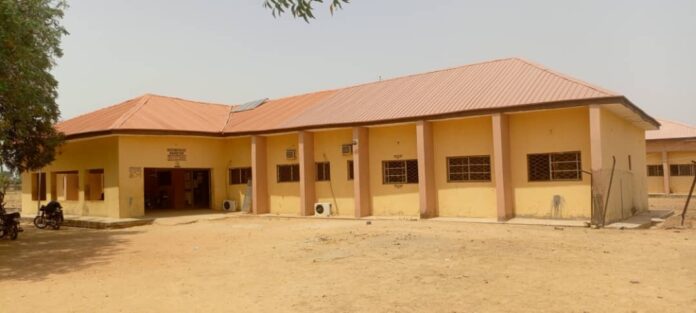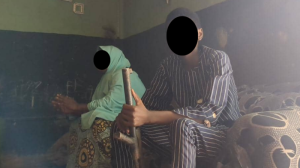Water is quoted as a key tool for adequate delivery of maternal and child healthcare.
According to the World Health Organisation, quoting the United Nations secretary-general, Antonio Guterres, “Water, sanitation and hygiene services in health facilities are the most basic requirements of infection prevention and control, and of quality care. They are fundamental to respecting the dignity and human rights of every person who seeks health care and of health workers themselves.”
This report examines how absence of water affects healthcare delivery in Kano State.
At the Contributory Primary HealthCare facility, in the headquarters of Rimin Gado which is the largest healthcare facility in Rimin Gado local government, all three overhead tanks that supply water to the facility were non-functional as of the time of this report. The only borehole at the health centre was also faulty when our reporter visited the PHC.
A staff member who doesn’t want to be mentioned in the media noted that they are usually made to source different alternate means to get water for maternity and lab rooms, most times, the fitness of the water cannot be fully ascertained but since they are left with no choice, they rely on these water sources in the absence of water in the PHC.
Other respondents told WikkiTimes that the absence of water makes healthcare delivery even more strenuous and difficult, posing a difficult risk for children and even pregnant women who need clean water from time to time.
Dugurawa PHC
The situation is not different at the Dugurawa PHC in Dugurawa village of Rimin Gado LGA. At the health center, water is a luxury as it is not available. Other villages such as Yango, Fanisau, Bankamawa, Kare, Kwajale, Dakatawa, Ingawa all from the same LGA rely on the facility
A village called Guddure in the neighbouring Bagwai LGA also relies on the primary health Centre, meaning that a total number of eight villages put their hopes on Dugurawa PHC which has no water availability. The population of Dugurawa village is put at 3500 persons while surrounding villages are estimated at over 3000 persons.
An official of the Centre, Malam Tijjani Habib told WikkiTimes that they usually rely on alternative sources of water to provide services to the patients who troop in from the different villages.
The unavailability of water, it was gathered, usually hinders efficient delivery of services, handicapping the persons who troop in from different villages with the hope of proper and adequate healthcare.
An average of 30 pregnant women and forty children uses the Doka Primary Health Centre daily, yet their only source of water has become faulty, leaving personnels of the PHC to source water from within the community, sometimes they are unlucky to get water.
Other villages
A staff of the health Centre, Nazifi Danjuma, noted that other villages that rely on the hospital include Farin ruwa, Becce, Katsalle, Unguwar Gamji, Wangara and Hayin Talata.
The situation is the same in other health centres visited by WikkiTimes in Kano. An example is the Na’Ibawa Layin Dan Hassan Primary Health Care. The situation isn’t different at Sabona Sa’a clinic, Yar Akwaa, Tarauni LGA.
Water scarcity in Kano
Kano has a history with water scarcity for long. With the coming of new Governor in 2023 the state, Abba Yusuf declared a state of emergency in the water sector. That is yet to make any meaningful change in the state.
In 2021, the state recorded 10,000 cholera cases within four months, a situation blamed on water scarcity, leaving people to source for alternative water sources.
At least 295 persons were also recorded to have died due to the situation.
A report earlier noted that primary health centres in Kano suffer largely for the absence of water, showing challenges and concerns on delivery of healthcare.
Poor expenditure on water worsens fate of clean water for healthcare delivery
In 2023, Kano State only spent 2.3% of its capital expenditure for the ministry of water resources.
While the sum of N14.1 billion was budgeted, it only spent N320 million.
In 2022, the Kano state government budgeted N10 billion for its water resources ministry capital expenditure but spent only N3.4 billion at the end of the fiscal period.
The highest amount it spent was in 2021. The state budgeted N7.8 billion but spent N5.4 billion.
The 2024 expenditure however offers hope, with N4.2 billion already spent in the first six months of the year on water resources capital needs from a budget of N12.7 billion
Like water, like health
The ministry of health in the state that could help delivery of healthcare and perhaps help cover up for the water ministry, also has a poor run of capital expenditure, with only 8.7% performance in 2022. While the state had an original budget of N18.9 billion, it spent only N1.658 billion in 2021, only 32.6% of the health ministry capital budget in the state was spent.
The situation did not get better in 2023 where the state budgeted N23.7 billion for its health sector capital needs but only spent N180.3 million.
The 2024 budget expenditure also offers no hope with only N959 million spent as of half year for the health sector capital expenditure from a budgeted sum of N42.5 billion.
The state also budgeted N5 billion for capital needs of its primary healthcare board but only spent N88 million in six months per details from its budget performance documents.
Dangers of absence of water at PHCs- Expert
A water advocate and director of Waterwide foundation, Wilson Atumeyi, had earlier noted that absence of water at PHCs can leave patients contracting different ailments due to use of contaminated water from unreliable sources.
He had also stated that absence of water can breed diseases such as Diarrhoea and Cholera. Already, Kano state has a history of high numbers of deaths due to cholera.
Other experts also warned that absence of water could be detrimental to healthcare delivery in the primary health centers, a situation that could lead to spread of diseases and increase fatality rate.
Already on multiple occasions the Kano state government promised to tackle the absence of water as a challenge faced by the state.
The government already declared a state of emergency in its water sector, stating that it is focused on ensuring that residents and critical sectors get better water.
Although the government solution seems to have been unable to solve the water scarcity problem, this will continue to add to the challenge in effective health care delivery in the state.
This investigation is produced with support from the Wole Soyinka Center for Investigative Journalism (WSCIJ) under the Collaborative Media Engagement for Development Inclusivity and Accountability Project (CMEDIA) and funded by MacArthur Foundation.



